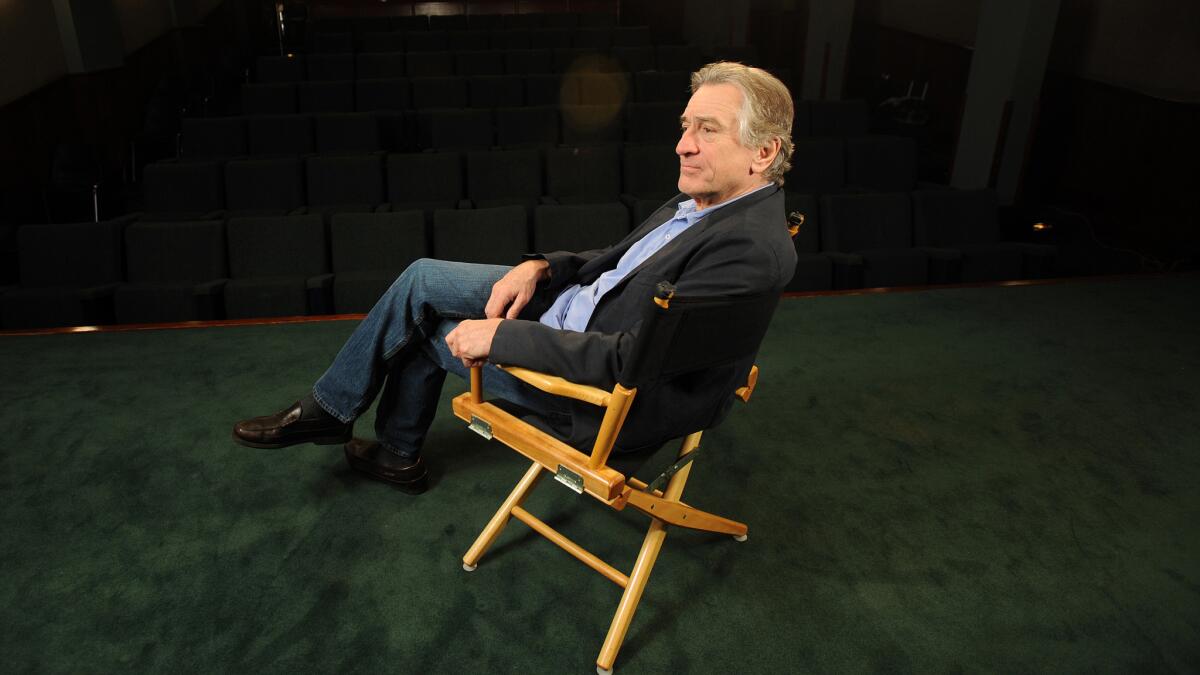Robert De Niro reverses course, yanks anti-vaccine film from Tribeca lineup

Robert De Niro at the Tribeca Screening Room in Manhattan in January 2013.
Reporting from New York — Facing a growing outcry, Tribeca Film Festival co-founder Robert De Niro has decided to remove a controversial anti-vaccine film from the gathering’s lineup.
Just a day after the actor revealed that he had personally pushed for a showing of the film, titled “Vaxxed” and directed by the polarizing anti-vaccine activist Andrew Wakefield, De Niro reversed his position.
“My intent in screening this film was to provide an opportunity for conversation around an issue that is deeply personal to me and my family,” De Niro said in a statement Saturday afternoon. “But after reviewing it over the past few days with the Tribeca Film Festival team and others from the scientific community, we do not believe it contributes to or furthers the discussion I had hoped for.”
Join the conversation on Facebook >>
Tribeca caused an uproar earlier in the week when it announced that “Vaxxed” would be screened at this year’s festival The movie alleges a “cover-up” by the U.S. Centers for Disease Control and Prevention over the measles, mumps and rubella vaccine increasing the risk of autism--a position that has been widely discredited by the scientific community and criticized for leading to a dangerous drop-off in MMR vaccinations. Recent years have brought an increase in measles outbreaks, including a high-profile series of cases tied to Disneyland in 2015.
The festival’s decision to give Wakefield a platform--he was also invited to speak as part of a post-screening event--was radioactive from the start. Social media reaction was swift and negative, and many science bloggers spoke out against the decision.
The New Yorker medical journalist Michael Specter told The Times that it was “shocking” and “disgraceful.” “This is a criminal who is responsible for people dying,” Specter said.
L.A. Times columnist Michael Hiltzik was also an outspoken critic. “That hand-waving in favor of ‘dialogue’ can shield a lot of damaging mischief,” he wrote.
On Friday, De Niro revealed that he, and not the festival’s programmers, had been the one who scheduled the film. He said his interest in the issue came from his experience with his child, who is autistic.
It was unclear what prompted the about-face such a short time later. De Niro in the statement sought to downplay the effects the negative publicity had on his decision.
“The festival doesn’t seek to avoid or shy away from controversy,” he said. “However, we have concerns with certain things in this film that we feel prevent us from presenting it in the festival program.”
Where this leaves Wakefield remains an open question. The activist could still seek to hold a separate screening in New York outside the festival on April 24, the day it was scheduled.
He also could use the decision as proof of a conspiracy against his theories.
“Once you give someone a platform, it’s very hard to take it away,” Specter said earlier in the week. “It creates a martyr.”
Still, the journalist said that the outcome was far preferable to the alternative, which would have given Wakefield a seal of legitimacy.
“It is comforting to know that in the end, Mr. De Niro and his colleagues at the festival responded to data and science rather than to emotion and fear,” he wrote in an email. “Many children will benefit from this decision.”
Wakefield did not immediately comment via social media or a representative. His Twitter page Saturday afternoon continued to tout the festival appearance.
“Please go now to the Tribeca Film Festival site for the whistleblower documentary VAXXED and thank them,” read the Tweet at the top of his feed, which included a link. The link went to a defunct Tribeca page; the film had been removed from the festival’s website.
Twitter: @ZeitchikLAT
ALSO
How Robert De Niro’s Tribeca Film Festivla sold out to Andrew Wakefield
Robert De Niro reveals he was the one who pushed for anti-vaccine movie at Tribeca
More to Read
Only good movies
Get the Indie Focus newsletter, Mark Olsen's weekly guide to the world of cinema.
You may occasionally receive promotional content from the Los Angeles Times.











